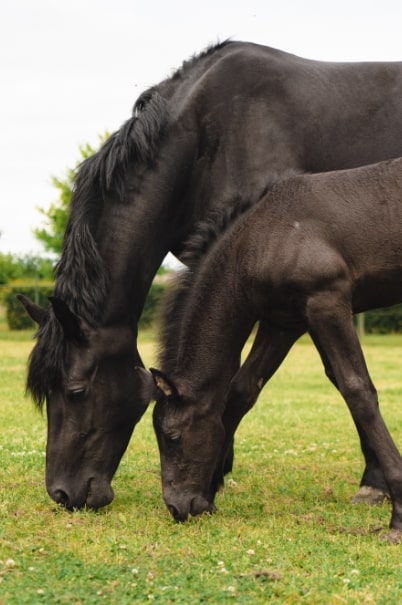Horses and ponies are more similar than they are distinct. Since they are much smaller, it is not difficult to mistake ponies for foals or colts. Yet, ponies aren’t the same at all. You need to keep the differences in mind, especially if you own both. Crucially you need to think about horse feed and pony feed, feeding strategies, and exercise.
What is a pony?
A pony is a small horse that generally never gets bigger 4 feet tall. They may seem like mini variants of horses, but ponies have their own temperament. Not to mention, their builds are sturdier compared to most full-sized horses.
Both ponies and horses belong to the same species and exist on the same family tree. Although, ponies remain small their entire lives. They mature more quickly than horses too. Pony foals are tiny and mature quickly to the approximate size of their parents. Horses grow slower; some don’t get to their full size until 6 or 7 years of age.
Differences
The clearest difference between horses and ponies is size. For most purposes, ponies are under 14.2 hands high for those riding English. If you’re a western rider, it’s under 14 hands. This size difference changes between places as well. It’s often the case that there are arbitrary sizes set for the show ring. Such size standards work to stop small horses and ponies from showing against bigger creatures whose size could offer them an advantage.
Feeding
The two also differ with their digestion. For this reason, you must be careful when shopping for horse feed or pony feed. Ponies are able to eke out nutrition from pastures that horses would starve on. Actually, overfeeding ponies isn’t difficult. So, they are more vulnerable to foundering and laminitis than horses.
Feeding ponies calls for an approach that is slightly different than with horses. They have smaller stomachs. So, while they can eat some of the same forage, you need to be careful with portion size. If you choose a concentrate feed, be careful to make sure it is suitable for ponies. Keep in mind they can gain weight quicker than horses too.
Certain horses can also be “hard keepers”, but most ponies are the extreme opposite. A hard keeper pony is a rarity. If you have one, it could be a sign of health complications.
Temperament
Both animals also have their own temperament. Ponies are more stoic and intelligent than bigger horses. It’s wrong to see this as docility. They can be rather wily. For this reason, it can be beneficial to find a quiet horse for a kid rather than a reliable pony. Ponies are good at avoiding work and putting up with the consequences. Horses can be quieter. Also, the bigger the breed, the more docile they are.
Strength
Another fact is that ponies are very strong for their size. They can carry or pull heavy loads with more strength than a horse, relative to their size. They are also hardier than horses and can put up with greater temperature ranges. Their coats normally grow thicker in winter and don’t shed out until the hottest days in summer. They start growing their thick coats back once the day shortens. Moreover, ponies have thicker tails and manes. Their hooves are normally tougher. What’s more, they are shorter-legged and heavier-boned in proportion to their bodies.
Lifespan
Ponies live longer than horses too usually. It’s not uncommon for ponies to live past 30 years old. Lots of old equines are ponies. People still use multiple ponies for driving and riding into their late 20s.
Talk to us if you need horse feed
At JS Hubbuck Ltd, we have plenty of feed options on offer for different animals. They will help you in keeping yours satisfied. Most crucially, we have fantastic product knowledge. We can work with clients to select feeds you can rely on to give animals the nutrition they need.
So, if you need horse feed, feel free to speak to us; we’ll make sure you have what you need.

